the real virus killing eswatini is royalty
king mswati hoards wealth while nurses go unpaid. the americans funded hiv treatment but ignored the regime that made the virus worse
In February, patients arriving at Eswatini’s Miracle Campus found its gates closed. A written stop order from USAID had forced the facility to suspend nearly all services. For years, this U.S.-funded campus had quietly delivered critical healthcare to a significant share of the population. Some medications, like HIV and TB treatments, were still being dispensed through emergency donor support. But the broader system buckled. With U.S. funding gone, the illusion of a self-sustaining healthcare system collapsed.
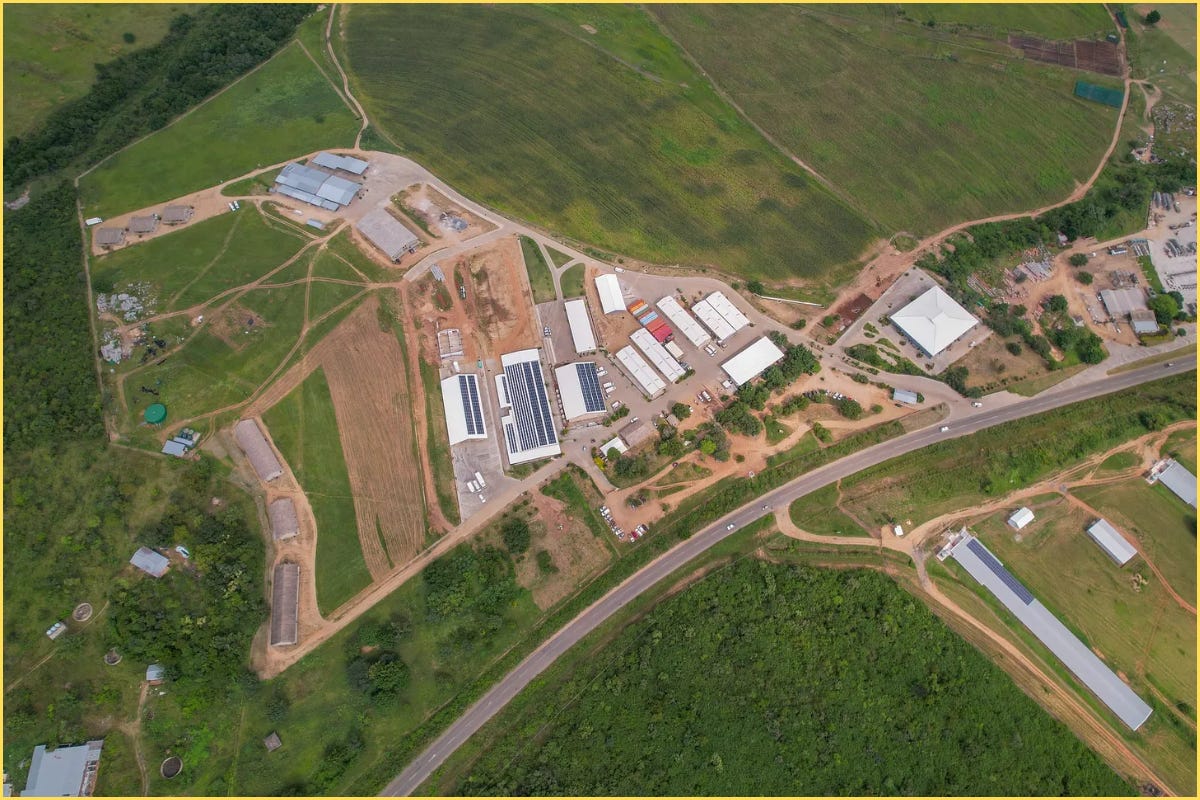
This is not just a story of aid withdrawal. It is a story of how one of the world’s most repressive monarchies avoided building robust public institutions altogether and how the global aid industry helped it do so. The collapse of healthcare in Eswatini is not just a crisis of foreign policy. It is a crisis of domestic autocracy, donor complicity, and the politics of dependence.
Eswatini, a landlocked monarchy of approximately 1.2 million people, holds the highest HIV prevalence globally, with an estimated 25.9% of adults aged 15–49 living with the virus. This staggering figure results from a complex interplay of historical, social, economic, and structural factors. During the late 20th century, labor migration led many Swazi men to work in South African mines, separating them from their families and exposing them to high-risk behaviors . Coupled with a chronically under-resourced healthcare system, the virus spread rapidly through communities with limited access to testing or treatment .
Social and cultural factors compounded the crisis. Gender inequality, economic disenfranchisement, and widespread sexual violence have left women disproportionately exposed to HIV. Early sexual debut, transactional sex driven by poverty, rape, and the normalization of male sexual entitlement are all legacies of a system that disempowers women while refusing to build protective institutions. This system is modeled from the top: led by a king who maintains 16 wives, and once even married a 17-year-old girl while publicly promoting chastity for others. He sets a public example that merges power, patriarchy, and impunity. The blame lies with the intersecting forces of patriarchy, poverty, and state neglect, reenforced daily by the nation's leadership.
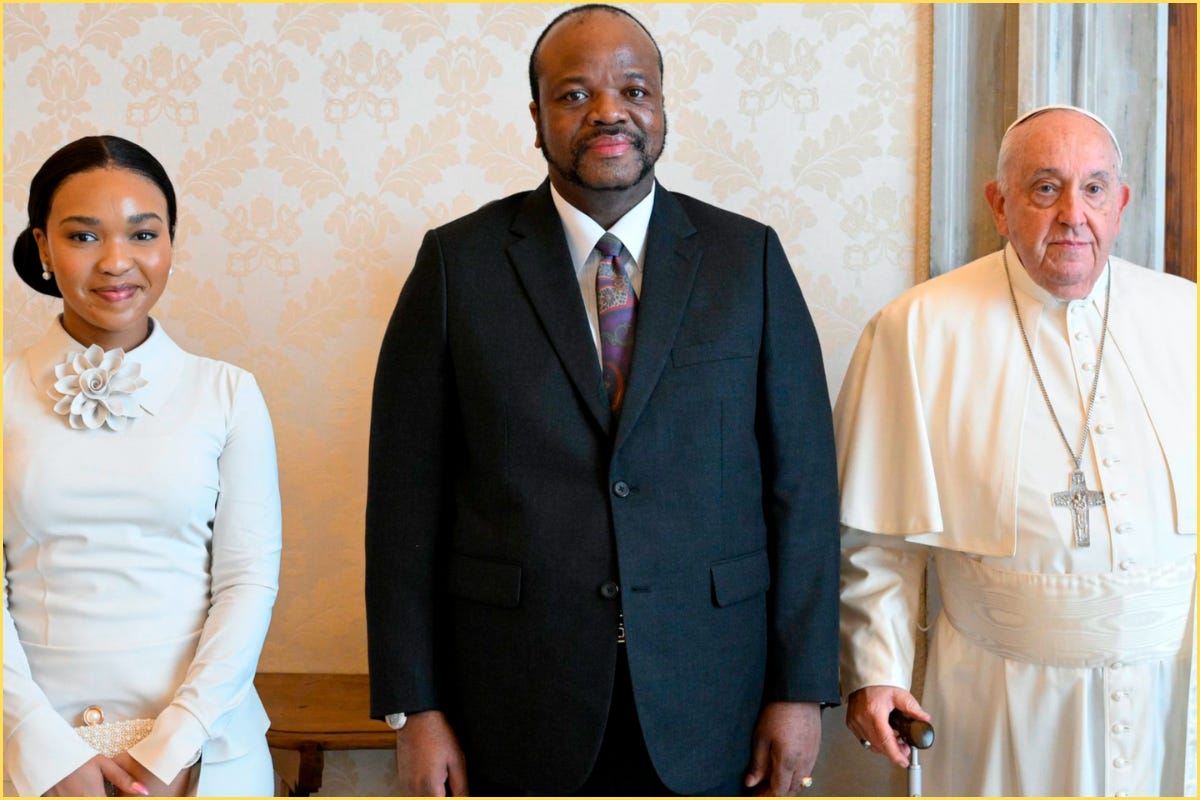
Despite these challenges, Eswatini met the UNAIDS 95-95-95 targets, the first African country to do so. But this milestone, while statistically significant, masked a deeper fragility. The success was built on foreign aid, not domestic commitment. When the money dried up, so did the care.
The real problem is how Eswatini’s health system was built. For years, U.S. aid let the king avoid spending his own government’s money to build hospitals and clinics. Instead of working through the public system, donors gave funds to outside organizations and programs that focused on specific diseases, without any demands for reforms. That meant the government didn’t have to take responsibility or build lasting institutions. In the end, this helped keep a dictatorship in power without holding it accountable for its own people’s wellbeing.
Meanwhile, Eswatini’s workers are no longer waiting. The country’s trade unions and grassroots movements, long suppressed by royal decree, are reemerging as a political force. On May Day, SWALIMO and PUDEMO issued joint calls for democratization and an end to elite plunder. Nurses, teachers, and civil servants have staged rolling protests over insufficient salaries and collapsing services. These are not just labor disputes. They are the frontline of a political insurgency against absolute rule, fueled not only by the healthcare crisis but by broader breakdowns in education, infrastructure, and food security. Sectors that have all suffered under the abrupt withdrawal of U.S. aid.

At the core of the crisis is the rule of King Mswati III, Africa’s last absolute monarch. He commands near-total control over the country’s wealth and political machinery. His personal fortune is estimated at over $200 million (Some estimates place King Mswati’s personal wealth as high as $500 million, over 10% of Eswatini’s entire GDP). A staggering sum in a country where over half the population lives in poverty, many on just a few dollars a day. But that’s only the visible tip. Through Tibiyo Taka Ngwane, a sovereign wealth fund supposedly held “in trust” for the Swazi people, the royal family is believed to control as much as half the national economy. Tibiyo owns stakes in sugar, hotels, banking, and more, yet it operates without public oversight, publishes no financial reports, and answers to no one but the king. What began as a development vehicle now functions as a private royal empire, enriching a dynasty while schools collapse, hospitals shutter, and workers are left underpaid or unpaid altogether.
The king’s extravagance is infamous. He reportedly owns two private jets, including one "gifted" for his 50th birthday. In 2019, he bought 19 Rolls-Royces and 120 BMWs for his family. Lavish residences for all of his 16 wives are built with public funds. In a country where more than half the population lives below the poverty line, and health spending is just $280 per person annually, this is not just obscene. It is a political strategy: starving public systems while enriching the royal family, not as a failure of governance, but as its intended outcome.
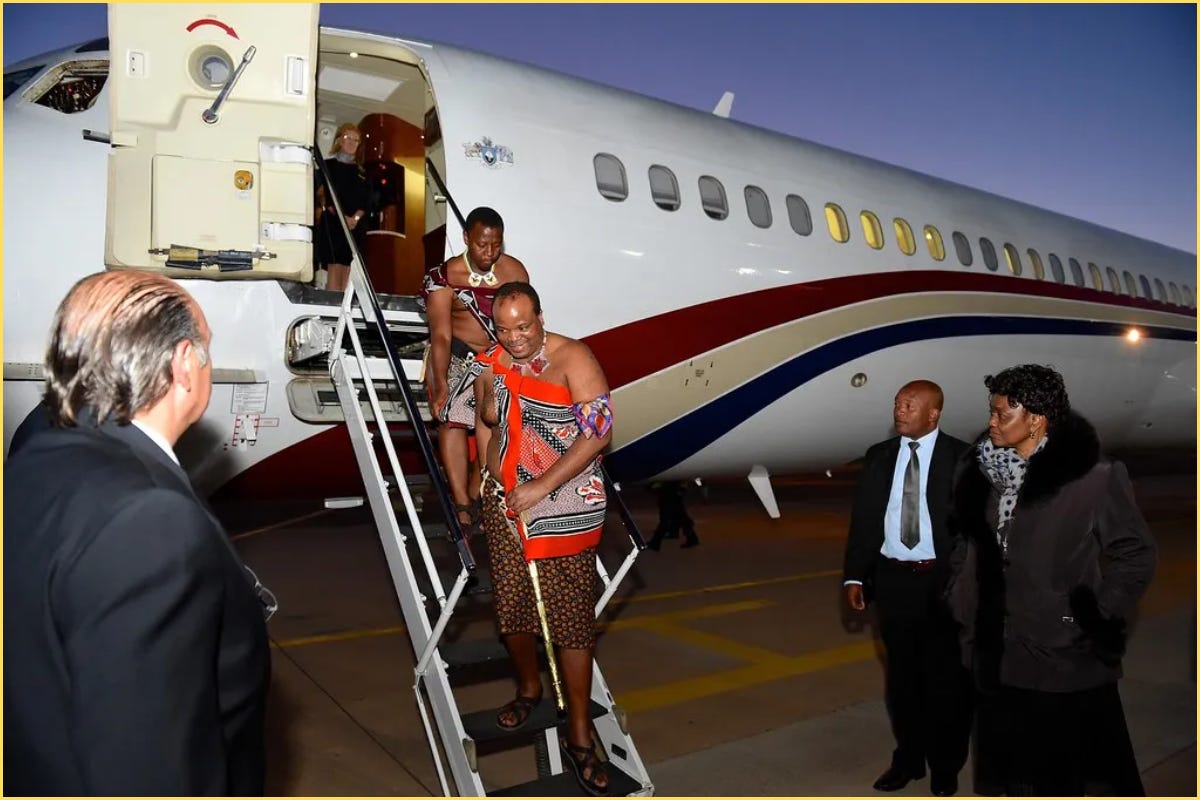
The economy deepens the crisis. Eswatini’s GDP stands at $4.6 billion, with 35% unemployment, 56% youth unemployment, and a Gini coefficient of 54.6, one of the highest in the world (last officially reported in 2016, with no confirmed update since then, but given ongoing global and regional stagnation, and the king’s relentless spending, inequality is likely unchanged or worse). None of this is accidental. Its the result of generations of elite hoarding, rural neglect, and an absent welfare state, stretching back long before the current king, and embedded in the political design of the monarchy itself.
But here’s the important point: this isn’t a debate about whether Eswatini can afford to fund healthcare or education. It can. The monarchy and its cronies have siphoned off enough national wealth to build a functioning public sector many times over. In a country this small, the royal family's vast fortune represents not just inequality, but outright theft.
Eswatini allocates around 7% of its GDP to health, but that figure misleads. Because since the GDP is so small, per capita health spending remains dismal, (hovering around $280, as i mentioned earlier). Meanwhile, in the 2024/25 fiscal year, the royal household was allocated at least E456 million (about $25 million) under the official budget line for royal emoluments and civil list. But this is only part of the picture. Additional expenditures for royal travel, security, and upkeep are tucked across ministries, bringing the true total to roughly E1 billion, more than 3% of the national budget. And all of that is separate from the king’s personal fortune ($200million). This is extraction: public money that could fund drug procurement, rural clinics, and staff salaries is instead funding the lifestyle of a monarchy that governs through hoarding.
Eswatini’s political structure ensures no accountability. The king appoints the prime minister, controls the legislature, and dominates the judiciary. Political parties are banned. In recent years, security forces have repeatedly opened fire on demonstrators calling for democracy, using live ammunition, teargas, and mass arrests to crush dissent. Journalists are intimidated. Activists disappear.
PUDEMO leader Mlungisi Makhanya has linked the healthcare collapse to elite corruption and neglect. In 2024, he reportedly survived a suspected poisoning while in exile in South Africa, an incident his party attributes to the Eswatini regime. Former MP Mduduzi Bacede Mabuza, was sentenced to 25 years in prison in 2024. He consistently warned of the monarchy's overreliance on foreign aid and failure to invest in public services. Human rights lawyer Thulani Maseko, a prominent advocate for democratic reform, was assassinated in 2023 while at home with his family. A killing widely seen as politically motivated. All three had publicly traced Eswatini’s dysfunction to monarchical impunity.

But the blame doesn’t stop at the palace gates. Although donor aid undoubtedly saved lives. Without it, Eswatini might have become a graveyard of avoidable deaths, and the monarchy likely wouldn’t have lifted a finger. But saving lives isn’t the same as building systems. Aid didn’t just deliver medicine; it delivered cover. It helped Mswati perform legitimacy he never earned. NGOs ballooned. Foreign contractors thrived. Western pharmaceutical firms sold lifesaving drugs at prices that made their shareholders very happy. And the regime? It stayed untouched, celebrated in donor reports for its HIV success while the public sector decayed, starved of investment and reduced to a backdrop for NGO and pharma expansion.
Meanwhile, African governments remained mostly silent. Treating Eswatini’s autocracy as a local eccentricity, not a regional crisis. Because the silence is not accidental. Many of these governments are themselves authoritarian or semi-authoritarian. They are wary of setting a precedent that calls their own legitimacy into question. Regional bodies like the African Union and SADC emphasize sovereignty over intervention, which often means looking away from repression. And economic ties or shared diplomatic interests make open criticism politically inconvenient. Aid didn’t just coexist with dysfunction. It became part of the infrastructure that protected it, and the silence that sustained it.
This is essentially the soft face of neoliberalism: metrics over real solutions, short-term outcomes over long-term objectives, NGOs instead of states. In Eswatini, that logic didn’t just fail. It fused with autocracy and produced a fragile system dependent on foreign goodwill and unbothered by the absence of rights.
The consequences are visible. With U.S. support gone, the Eswatini government allocated just E30 million (roughly $1.66 million) in emergency aid to The Luke Commission. That’s a steep decline from the $7 million the U.S. previously provided each year, which covered nearly a third of TLC’s $21 million budget. Clinics are overwhelmed. Drug shortages are widespread. Patients are dying from treatable conditions. And families are forced to choose between buying medicine or food.
The Global Fund approved a new $46.7 million grant to cushion the blow. But even this is temporary. Without domestic transformation, Eswatini’s health gains will evaporate the next time a donor pulls out.
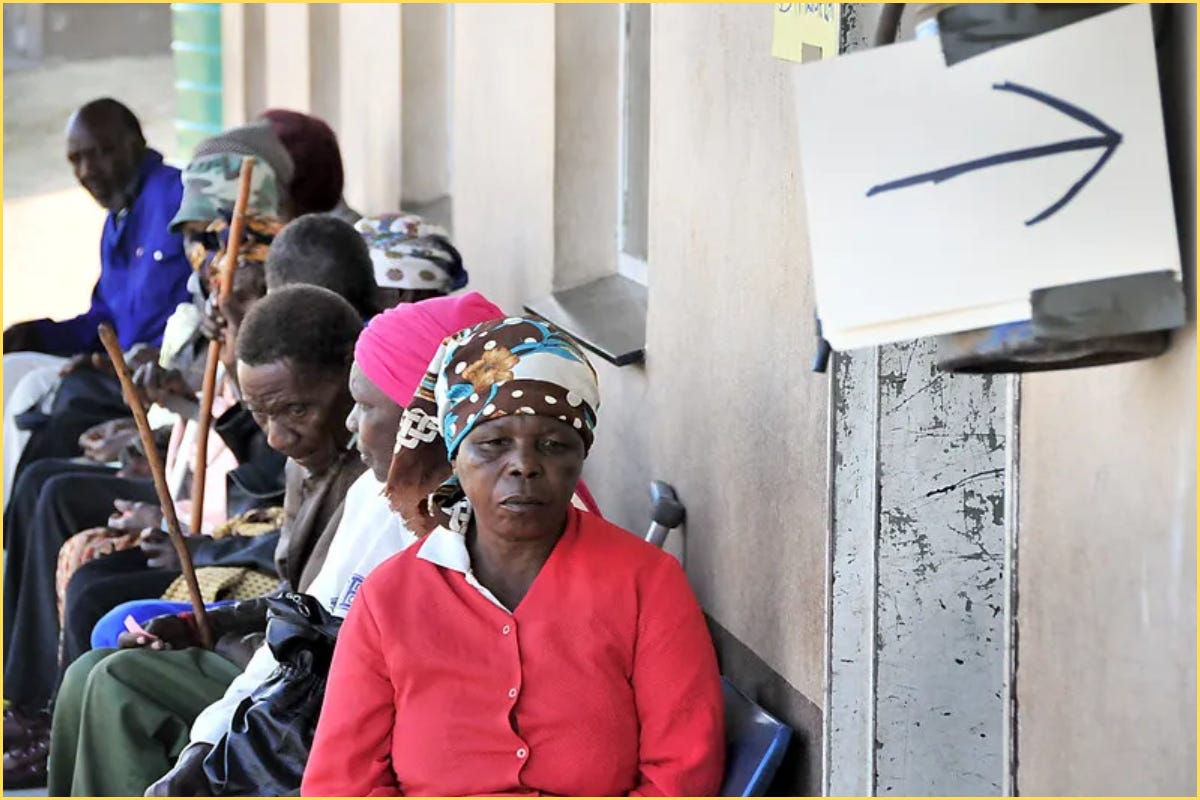
There is an alternative, but it begins with political clarity. The monarchy is not a cultural relic. It is a political institution that siphons public wealth, blocks accountability, and uses tradition as a shield against redistribution. Eswatini doesn’t need a sovereign with jets and a private sovereign fund. If symbolic monarchy remains culturally important, so be it. But it must be ceremonial, toothless, and cheap. The real sovereign power must be civilian, democratic, and answerable to the people.
Nationalize Tibiyo Taka Ngwane. Strip it of its opacity and transform it into a publicly managed investment vehicle. Tax royal wealth. Shut down the palace budget. Redirect those funds to community-run clinics, public salaries, national drug logistics, and the infrastructure of a functional economy. Rebuild trust by rooting governance in the people who deliver and rely on public goods, not just in healthcare, but across the economy, through elected councils, union representation, and participatory budgeting. Let healthcare be the first case study of state ownership and democratic control. But don’t stop there. Once Eswatini can manage its own health system, it should leverage that success to demand investment in broader economic development, from the same international actors who were willing to bankroll treatment but not transformation. It likely won’t happen. But the demand matters. It reframes what aid should do, and who it should answer to.
This is not a fantasy. It’s a political necessity, and it begins with control: not just over budgets, but over how growth and governance are defined.
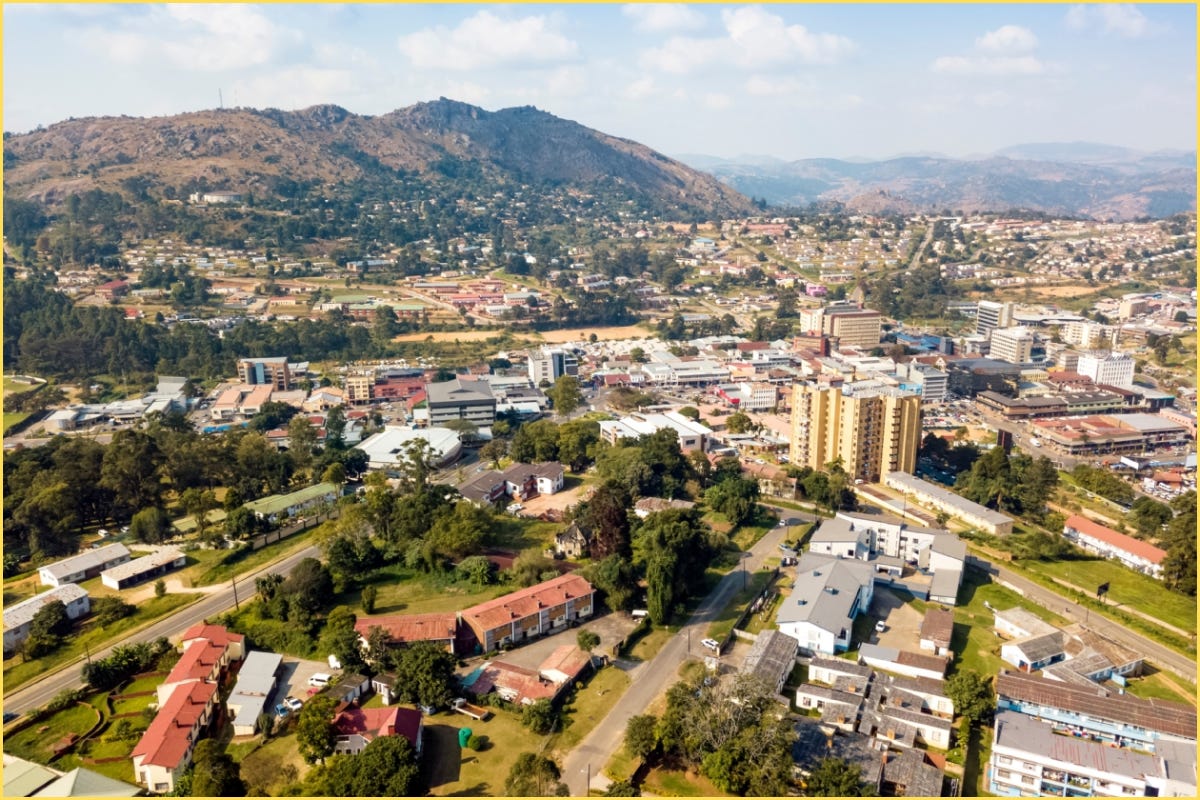
Eswatini isn’t suffering from donor fatigue or monarchical excess. It’s both: sovereignty eroded from above by aid dependency, and from below by royal extraction. The country was ruled through spectacle and survival-by-outsourcing. Kings playing patriarch, donors playing savior, and neither building anything meant to last.
The way out demands political will. It definitely demands a fight. Eswatini won’t recover by rebranding monarchy or tweaking metrics. It must build power at the root. In unions, in communities, in public systems controlled by those who keep them running. This isn’t about symbolism or charity. It’s about democratic control: over wealth, over policy, over the future. Power won’t be handed over. It has to be taken, and restructured to serve the many, not the few.


